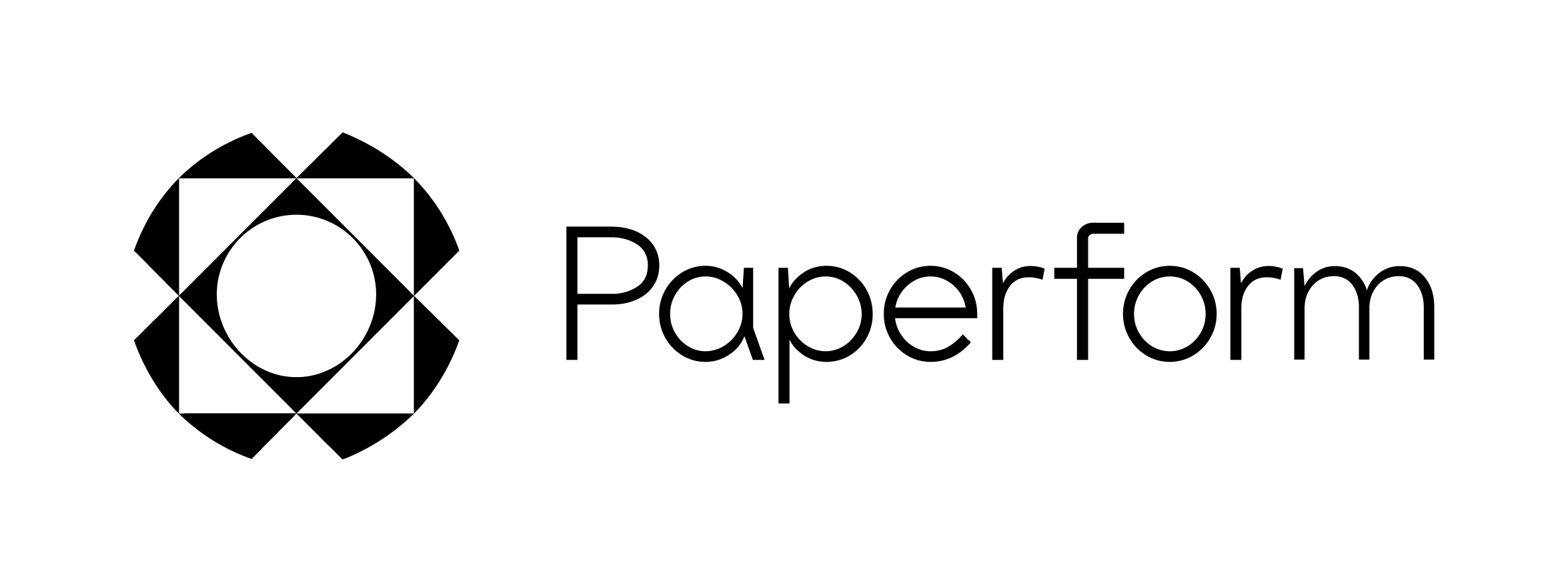
All Solutions
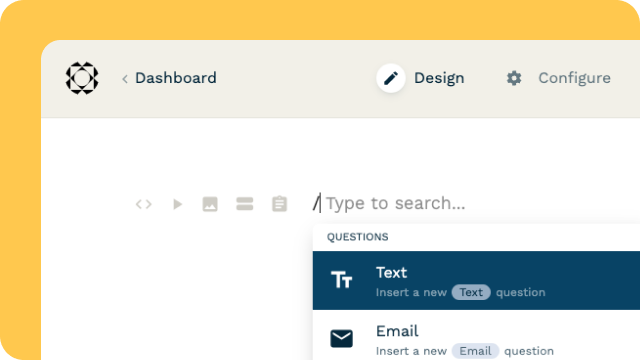
Explore all the solutions you can create with Paperform: surveys, quizzes, tests, payment forms, scheduling forms, and a whole lot more.
See all solutions










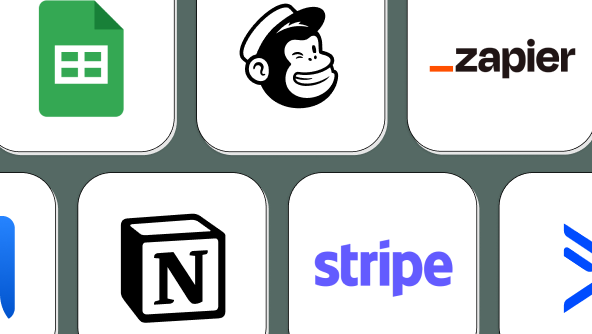
Connect with over 2,000 popular apps and software to improve productivity and automate workflows
See all integrationsProducts
Solutions
All Solutions

Explore all the solutions you can create with Paperform: surveys, quizzes, tests, payment forms, scheduling forms, and a whole lot more.
See all solutionsIntegrations

Connect with over 2,000 popular apps and software to improve productivity and automate workflows
See all integrationsResources
The 8 best Calendly alternatives in 2026

Calendly is free, simple, and doesn’t take a lot to set up. As a scheduling tool, that’s its claim to fame. And it’s true—for the most part.
The problem is that simple often means limited. If you’re looking for an automated scheduling tool that does a bit more than the basics, it doesn’t hurt to take a closer look at your options.
To help, this guide outlines the best and worst of each Calendly alternative so you can make an informed decision for your business.
Why look for a Calendly alternative?
People and teams use Calendly because it’s simple and it does what it says on the box. It's a great tool.
Whether you're a busy solopreneur that needs to automate as many processes as possible, or you simply want a way to manage remote team meetings, Calendly can get it done.
But it's not perfect. There are some pretty serious drawbacks:
- It’s expensive: While Calendly does offer a free plan, it’s highly limited in what it allows you to do. While its paid plans are better, they start at $8 per seat, which is costly for a basic tool.
- It has poor customer support: In trouble with configuring any Calendly features? You can’t count on customer support to help you solve the issue. Calendly’s customer support is known to not be the greatest.
- It's not mobile-friendly: Scheduling happens on the go a lot of the time. Unfortunately, Calendly wasn’t necessarily built with a mobile-first approach.
- It's not built for collaboration: If you want to book meetings with several attendants or need a way to schedule group appointments, Calendly doesn’t make it as intuitive as it could be. You have to use a third-party integration or opt in to one of its more expensive plans for additional features.
All this is probably why you're looking for an alternative. So let's hop to it.
The 8 Best Calendly Alternatives in 2026
1. Paperform
Best for: Users looking for an all-in-one solution for booking appointments and selling services.
Paperform pros
- Take bookings and payments in one place
- Automate reminders and follow-up emails
- Flexible customisation and branding
- Embeddable anywhere on the web
- Create personalised shareable links
- Offers thousands of integrations
Paperform cons
- Learning curve for advanced features
Imagine a tool that lets you schedule all kinds of bookings. We’re talking about a scheduling experience with beautiful forms that can accept payments, automate email outreach, and build surveys. That’s Paperform in action.
As an alternative to other scheduling software, Paperform doesn’t only ensure you never miss a meeting—whether it’s one-on-one or a whole team get-together—it also enables you to create hundreds of different form types.
With it, you can specify how long you want meetings to last, automate when email confirmations are sent out, and share your custom page with a personalised link.
You can take payments through Stripe, Square, or PayPal, connect multiple calendars, and use the no-code designer to edit layouts and colours to match your branding.
There is even native integration with Unsplash, GIPHY, and Adobe Creative Cloud to make curating your own look a breeze.
To top it all off, Paperform’s integrations make it easy to plug into your existing suite of applications—monday.com, and Notion just to name a few. Plus, there's functionality to build rescheduling software.
If you're looking for a more versatile alternative to Calendly that empowers you to do way more than take bookings, then Paperform is the way to go.
Paperform pricing
Paperform offers a free plan to get started, with no credit card required. Paid plans start at $24/month, and include unlimited booking pages, payments, and integrations.
2. TidyCal
Best for: Marketing and business teams who want a no-frills booking solution.
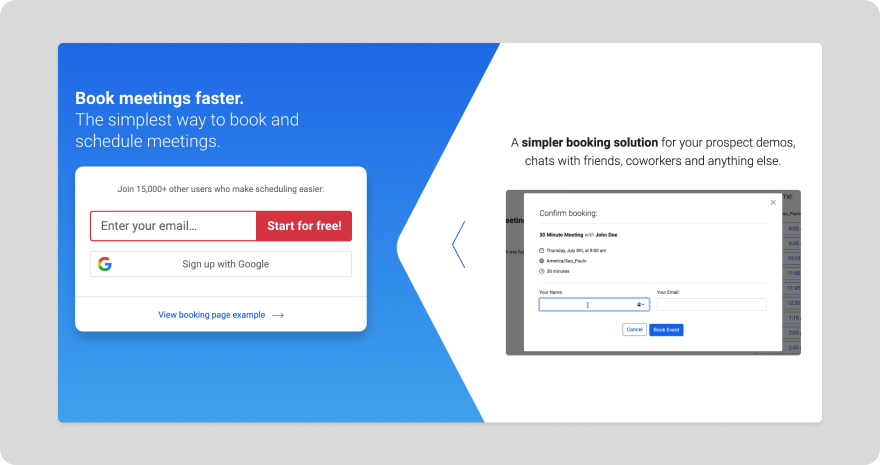 (Image via TidyCal)
(Image via TidyCal)TidyCal pros
- An accessible scheduling tool if you’re looking for a quick-fix
- You’re able to share custom booking pages
- Offers API and Zapier integrations
TidyCal cons
- Too simple to take care of more complex scheduling needs
- Limited branding capabilities
TidyCal is your go-to tool if you’re looking for a fuss-free solution to your scheduling needs.
It can accept payment through Stripe or PayPal for paid meetings and you can share your forms as embeddable widgets.
Keep in mind that it only comes with ten calendar connections and if you want a custom URL, you will have to set up a redirect to make it happen.
Unfortunately, once you pay the one-time fee, you can't upgrade or downgrade to a different TidyCal plan. And there's no way to fully remove the TidyCal branding.
TidyCal pricing
TidyCal offers a free plan with limited features. The Lifetime Plan is available for a one-time purchase of $29.
3. Cal.com
Best for: Technical teams looking to build their own booking system.
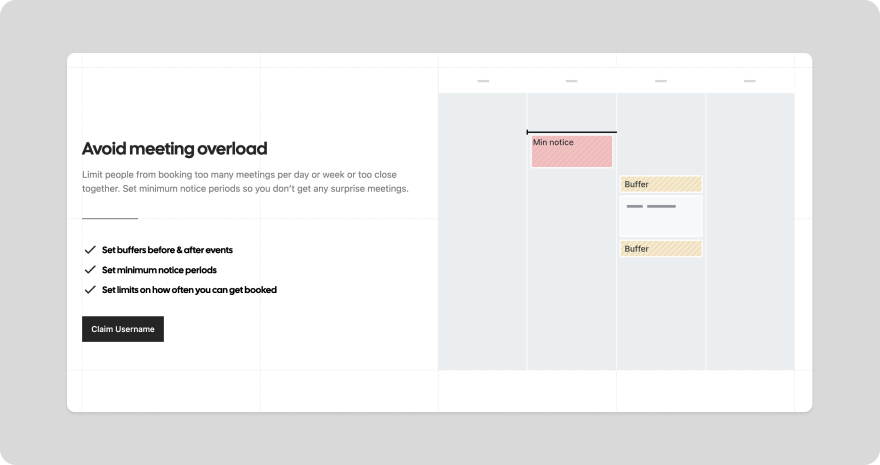 (Image via Cal.com)
(Image via Cal.com)Cal.com pros
- Comes with rescheduling features built-in
- Set availability on a repeating schedule each month
Cal.com cons
- Built primarily as a scheduling tool that’s great to repackage for resale
With Cal.com, you can forget about the back and forth in emails it takes to finally settle on a date and time that works for all parties involved.
With automations and no-code configuration options, Cal.com puts you in the driver’s seat of your schedule.
Even if you’re running on multiple calendars, Cal.com centralizes all of the popular calendars so you get visibility into what your availability actually is.
Now, if you want to get fancy with embedding or calendar widgets, you will have to look elsewhere for those features. However, Cal.com does allow you to share your calendar landing page by sharing a scheduling link.
Cal.com pricing
Cal.com offers a free plan for basic scheduling needs. Paid plans start at $15/user billed monthly.
4. GReminders
Best for: if you prefer to manage your schedule through text.
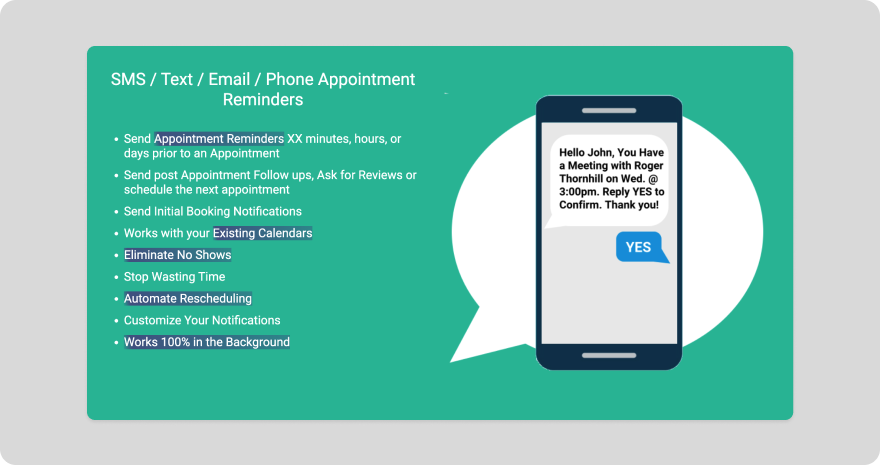 (Image via GReminders)
(Image via GReminders)GReminders pros
- Customizable reminder messages
- Automated rescheduling features
- Automate post-appointment follow-up capabilities
GReminders cons
- Is built for basic scheduling needs with limited features.
Nobody likes no scheduled no-shows and it’s the pain point a scheduling tool like GReminders was built to solve.
Once you integrate it with either Google Calendar or Outlook and book your meetings, it automatically sends prompt reminders to users you’ve booked with you.
You either get an SMS notification, a text, an email reminder, or a phone call to ensure you don’t miss a meeting.
GReminders pricing
GReminders offers a limited free plan with email-only reminders. Paid plans start at $8/month, billed monthly.
5. Doodle
Best for: if you don't care about branding your scheduling tool to your business.
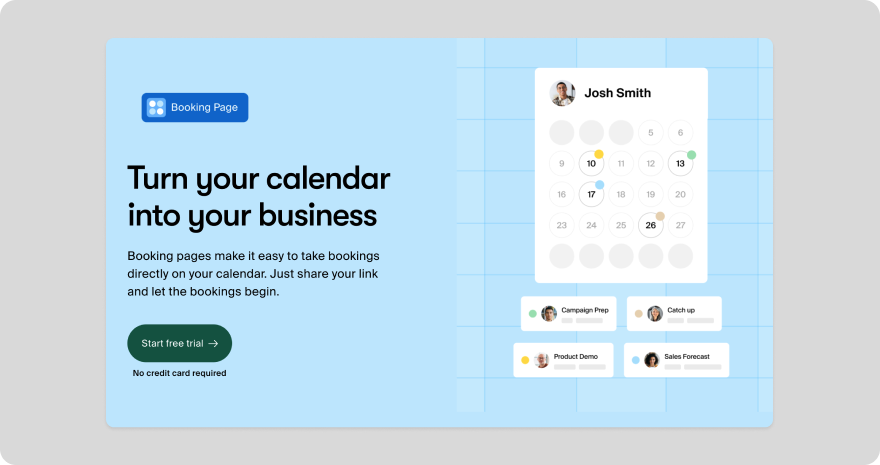 (Image via Doodle)
(Image via Doodle)Doodle pros
- Sync Google Calendar with availability options
- Accessible and user friendly
- Comes with polling features
Doodle cons
- Lack of customisation and branding
- More expensive for teams than other options
If you need speed then consider a scheduling tool like Doodle.
It only takes a few minutes to set up, and comes with robust security if that’s a concern in your industry. Doodle can work just as well for individual needs as it can for enterprise scheduling needs.
Once you’ve set up your availability, all you have to do is share an invite to your booking page. The rest takes care of itself. As a tool, Doodle is clean and intuitive with plenty of integrations to make life easier.
A downside? It isn’t built for customization. So if branding and being able to customize specific features is important to you, something like Paperform might be a better bet.
Doodle pricing
It's free to create a basic account with Doodle. Paid plans start at $6.95/user per month, and can only be billed annually.
6. SimplyMeet.me
Best for: teams who only have a few meetings each month.
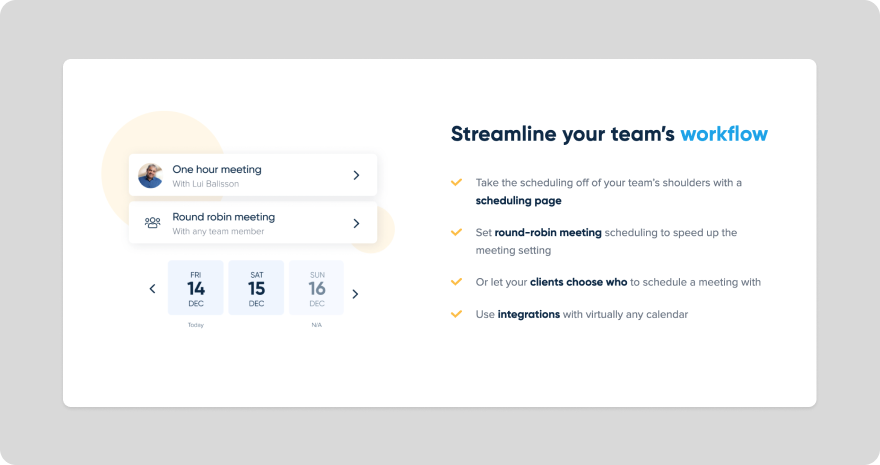 (Image via SimplyMeet.me)
(Image via SimplyMeet.me)SimpleMeet.me pros
- Google Calendar, Outlook, Zoho, iCloud, Zimbra, and other CalDAV solutions
- ISO 27001 certified for an extra level of security
- Enables you to centralize all your scheduled meetings in one simple dashboard
SimpleMeet.me cons
- No option to access additional features with paid plans
- Can’t customize with brand colours or custom CSS
- Not built for complex or enterprise-level scheduling needs
- Hard to scale with the needs of your business
SimplyMeet.me is free. That’s great, right? As a scheduling tool, it’s secure and comes with all the basic features you’d expect.
Users can easily pencil themselves in for a meeting with you once you send them your booking link.
It’s also designed to send automated confirmations and reminders so you can set it and forget them while ensuring clients show up to meetings on schedule.
While simple, SimplyMeet does allow you to integrate payment Platforms like Stripe to enable payment collection for paid appointments.
SimplyMeet.me pricing
SimplyMeet.me offers a free plan for individuals that includes three calendars and up to 500 meetings/month. Paid plans start at $9.99/user/month, billed annually.
7. Sprintful
Best for: individual users who only need a single booking page.
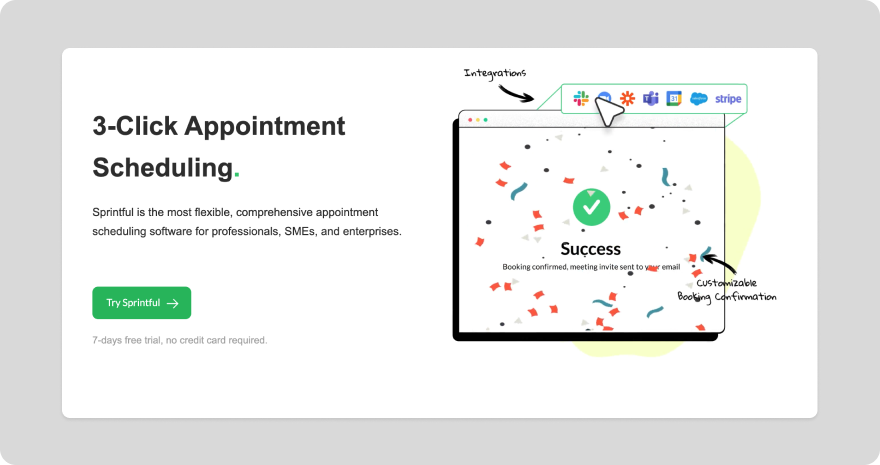 (Image via Sprintful)
(Image via Sprintful)Sprintful pros
- Schedule one-on-one, team, or group meetings for virtual events
- Integrates with Outlook and Google Calendar
Sprintful cons
- Limitations on bookings and reminders
Three clicks and you can successfully schedule a meeting with Sprintful.
As a scheduling tool, you can expect it to deliver plenty of automated scheduling features so you never miss a meeting.
Like Paperform, it allows you to create a custom domain for an elevated branded booking experience.
However, each plan has a limited number of booking landing pages you can create. The automated reminder notifications you can send a month is also limited, which is a bit of a bummer.
But hey, you can schedule group events like virtual yoga sessions (perfect for midday work breaks if you manage a remote team.)
Sprintful pricing
Sprintful plans start at $9/month. There is no free plan but you can try it out with a 7-day free trial.
8. CalendarHero
**Best for:** AI-powered schedule management.
 (Image via CalendarHero)
(Image via CalendarHero)CalendarHero pros
- Offers custom branding options
- Comes with meeting room booking options
- Easily embeds in any website
- Able to collect payments for paid appointments
CalendarHero cons
- Clunky customization features
Artificial intelligence is slowly taking over the world, including appointment scheduling software.
With AI, CalendarHero attempts to act like a personal assistant by understanding your daily work habits and meeting patterns to determine your best time slots.
CalendarHero also comes with monitoring features. This is useful if your IT department wants to keep an eye on how much the tool is being used, which can be valuable procurement data.
With plenty of integrations and collaborative features for teams with more complex meeting needs, CalendarHero is a solid option for teams looking for plenty of scheduling functionalities—and open to trusting AI with their calendar.
CalendarHero pricing
CalendarHero has a limited free plan, with paid plans starting at $8/month.
What’s the best Calendly alternative for you?
If you just need a simple online booking tool then you can probably stick with Calendly.
But if you’re looking for a cost-effective calendar scheduling tool that allows you to book appointments and sell services in one place, Paperform is the way to go.
Instead of having to cobble a handful of tools together to achieve the flexible and customisable features you’re looking for, use Paperform to set up automations, take payments, and easily stay on top of your most important meetings.
Form a better life now.
Get your 7 day unrestricted trialWhen Kathleen Celmins launched her AI-powered app, GlowSocial, she quickly realized that building cu...
Paperform has been recognized as a 2026 G2 Best Software Award winner! It is an honour we are deeply...
This article will help you untangle the web of very “samey” WordPress form builder plugins.
Trying to decide between Zapier and Stepper? This in-depth comparison breaks down pricing models, wo...